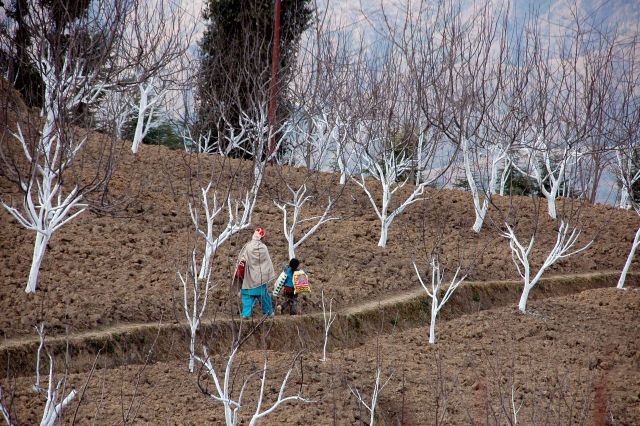Manali: Long dry spell in orchard country of Kullu Manali has apple plantation growers worried for not only is the valley yet to receive its first good snowfall of the winter season but the unusually warm days & nights are threatening the very cropping pattern in the year ahead.
“I’m really getting concerned about the chilling hours requirements of our apple trees because was an unusually warm December and so is it in January,” said Rajesh, an worried framer upper Kullu valley.
“These are supposed to be prime days meeting the chilling hours of the trees, and it is not happening. The warm weather could affects all of temperate fruit trees, be it apples, pears, peaches. With this weather in December and January, as a grower I’m really worried about the prospects of a good crop in the year ahead,” said Rajesh.

With apple trees not getting the required number of chill hours during winters and frequency of snowfall decreasing over the years, many diseases have damaged orchards across Kullu valley which has impacted yearly production.
Total area under apple plantations in Kullu district is 24,000 hectares and nearly 85 per cent of this is covered with ‘royal delicious’ variety. This strain of the royal apple variety needs at least 1,600 hours of chill for the trees bearing the crop before a spring blossom. The required chilling hours not only results in good crops but also controls many plant and fruit diseases. With winter season shrinking every year and regular snowfall frequency also decreasing, most plants are not getting enough chilling hours that is causing rise in attack of fungal diseases leading to dying of trees or in uneven apple production.

Average night temperature in Kullu valley has remained over the freezing point. Apple trees need a minimum of 66 days of chilled temperatures during winter dormancy days for producing good and healthy crops. With much of winter nearly over and as temperatures start rising in March, apple farmers are only gazing at the skies or surfing out weather forecasts on smart phones for cold weather to set in and improve crop prospects.
According to horticulture deputy director B.C. Rana, area under apple cultivation in Kullu is increasing by one hectare every year, but simultaneously replacement of dead trees is also continuing at a sharp pace as climate change is proving fatal for the plant.
“To cope up with plant diseases we are now growing the imported French and American varieties like Super Chief, Scarlet Spur, Scarlet Spur 2 & Red Chief which are more resistant to diseases,” said Rana.

The uncertainty over a good snowfall is the main worry for apple orchard owners. December, which used to be the main winter month, has largely gone by dry without there being any rain or snow.
Canker, a bark disease on apple plants which mostly develops due to environmental factors, insect infestation, mechanical damages and chemical injury, has emerged as one of the most fatal diseases in apple orchards. Worse, it spreads fast from tree to tree and eventually kills the plant. Apart from the chilling hours needs, extreme cold condition is best panacea for control of canker and many other diseases.
Warmer weather caused by environmental changes has already resulted in about 600 hectares of land in lower Kullu having shifted to pomegranate cropping and production. About 6,000 hectare of land in Kullu valley is under plum, peaches, pomegranate, apricot and plantations of other fruits than apple.
“In our nurseries, we are growing over 30 lakh saplings of various varieties of apple in Kullu every year which are being supplied to states of Uttarakhand, Sikkim, Arunachal Pradesh and others. Besides we are also exporting nursery plants to neighboring countries” Rana disclosed.

Sanjay Dutta, an engineer by qualification but is a journalist by choice.
He has worked for the premier new agency Press Trust of India and leading English daily Indian Express.
With more than a decade of experience, he has been highlighting issues related to environment, tourism and other aspects affecting mountain ecology.
Sanjay Dutta lives in a village close to Manali in Kullu valley of Himachal.


